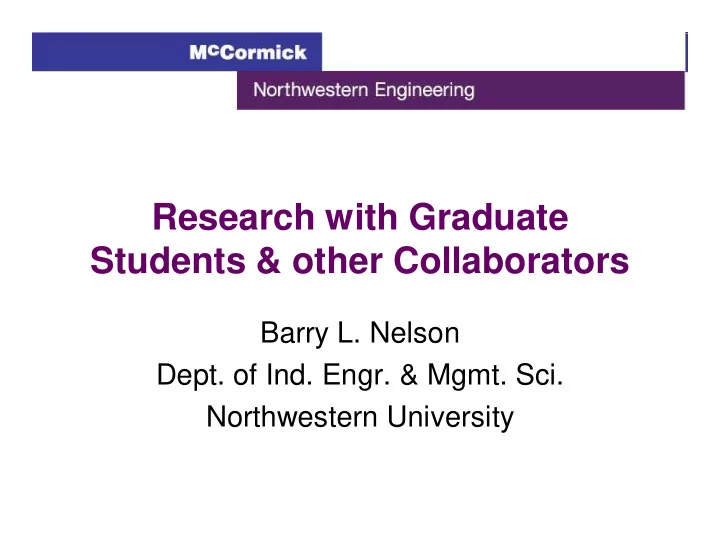

Research with Graduate Students & other Collaborators Barry L. Nelson Dept. of Ind. Engr. & Mgmt. Sci. Northwestern University
What is the relationship of the M.S./Ph.D student to the adviser? A. Slave labor to get the adviser promoted B. Independent agent who delivers a research product the adviser evaluates C. Collaborator on a research project or projects D. Apprentice on all aspects of professional career (teaching, research, service, etc.)
Getting started is the hardest part • Each student is different, do not count on them being like you. • A little success goes a long way: – Start with fairly structured assignments – Let the student finish a result you almost have completed – Computational work builds intuition and a sense of accomplishment – Don’t forget background reading
As an adviser you should… … answer student questions by saying “What do you • think?” • …defend students from unfair and inappropriate questions, but not difficult ones, during oral exams • …beat students up when they practice for public presentations (much better in private than before a live audience). • …keep their research from going in completely hopeless directions, but not from going down any dead ends. • …understand that at least 2/3rds of their ideas will not work out. • …let students know what your standards are, and that being correct matters more than being published.
Tell your students they should… • …take notes during or after meetings with you, and echo a copy back to you. • …help write grant proposals, referee papers, teach and do some busy work (these are all great practice; look at them as professional enhancement opportunities). • …speak at professional conferences. • …eventually set the direction of the research (that is how we know that they are done).
Writing • Write early and often. • Don’t just mark up student writing; tell them why you want the changes and what you are trying to achieve. – Emphasize clarity first; style comes later – Have them read good writers (Whitt, Andradóttir, Fox) • Write thesis as “k papers and a staple”
Grab bag of stuff I believe • Tell students to have a notebook for each research project. • Date everything they write (including computer code). • Let student be first author on their work. • Take the time to practice talks with them. • Take the time to introduce them to colleagues.
Working with colleagues • Read each other’s work; be constructive and honest---don’t hide problems. • Understand that a significant investment in learning to speak each other’s language may be needed (and is worthwhile). • Consistently revisit the “big picture” of what you are doing. • Add what you know; learn what they know.
Working with senior colleagues • Pay attention not only to the research, but also to how your senior colleagues work (especially proposal writing). • Respect their experience, but insist on understanding what you are doing. • It is ok to be the “muscle” if you believe in the research and you learn something. • Don’t allow your name to be on anything that is not of high quality or to which you did not contribute. This recommendation does not change even if they vote on your promotion. – Note: There is more than one way to say “no.”
Odds & ends… • Senior colleagues can be a good sounding board for testing the value of an idea. – And it is worth testing the value of an idea before investing substantial time into it. • Avoid the temptation to scoop someone else’s idea; offer to collaborate instead. • Try to avoid author-order fights; go with alphabetical if there is any tension.
Discussion Items • What do you do if a student is not succeeding or does not appear to be able to cut it? • What percentage of the thesis can be you, rather than the student? • How many students/collaborations can you have at the same time? • What is your role as a committee member, but not the adviser?
Recommend
More recommend